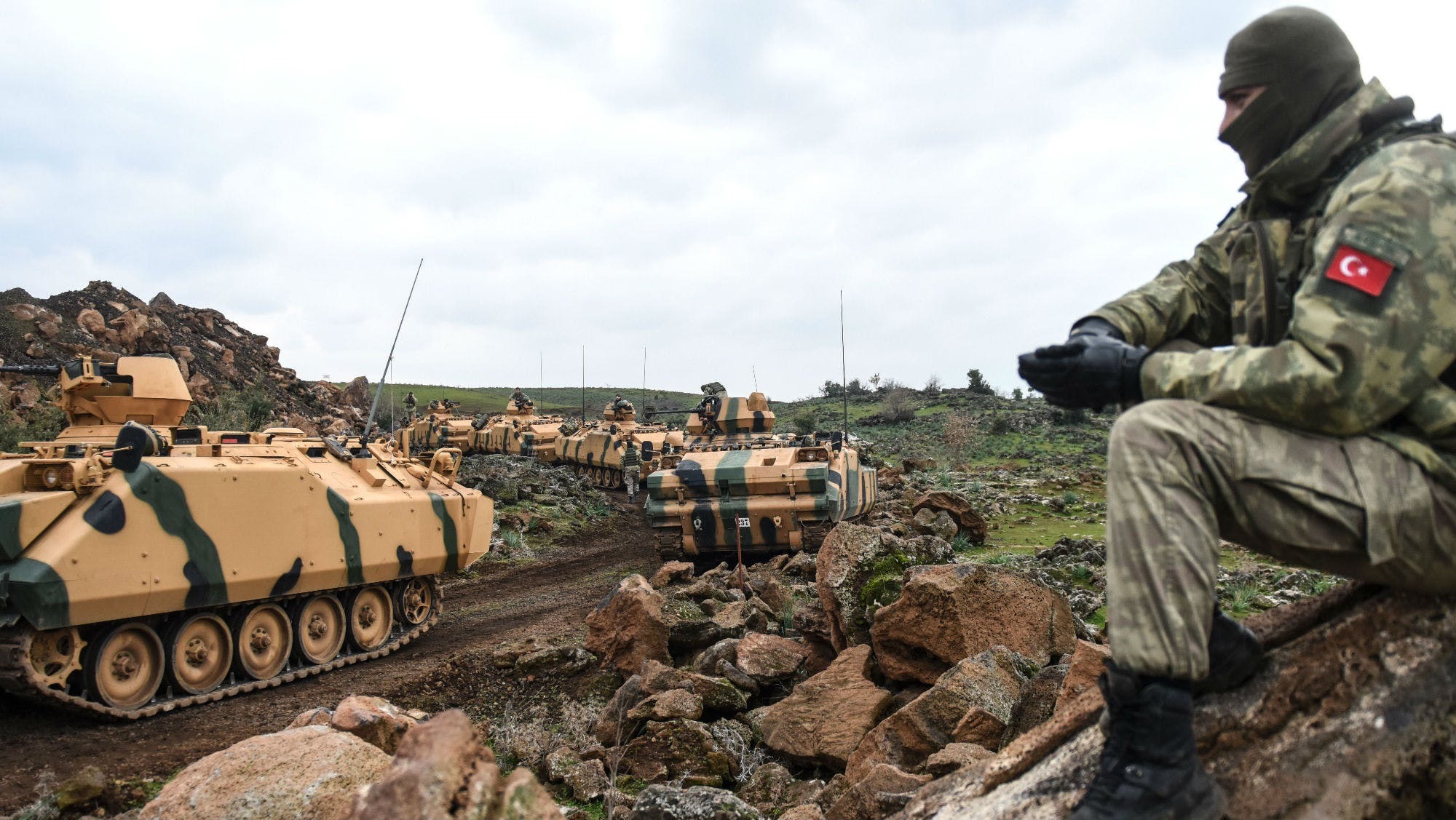The Trump Doctrine Is Working In Syria
When he took office, President Trump inherited a mess in Syria. His administration worked diligently to defeat Islamic State (ISIS), which had grown into an international terrorist pseudo-state that threatened US interests. Upon completing that project, he began to pull back, in keeping with his campaign promise to reduce US military interventions overseas where US interests are not at stake.
In Syria, President Trump faced the first true test of his “Trump Doctrine” by creating a cooperative coalition of interests that will work together to defeat the common enemy (i.e. Islamic State) while not fighting amongst themselves. A peace that does not require the presence of a large US occupation force and relies upon international cooperation is not a novel concept, but the United States has rarely pursued it since before the Second World War.
That particular approach can be safely dubbed the Trump Doctrine. Nevertheless, a false narrative has arisen that blames President Trump for a war that he is neither responsible for starting nor for US involvement.
The Syrian Peace Settlement
Polls consistently show over 80% of Americans desire fewer foreign wars. The Washington establishment (aka the “Swamp”), however, have consistently involved the United States in conflicts overseas against the wishes of the American people.
Democrat and Republican Presidents alike have interceded in conflicts from Bosnia to Libya, from Iraq to Afghanistan. Several of these conflicts are ongoing, and in many cases one could reasonably question whether US intervention has done any good. Yes, Bosnia is now a stable country, but Iraq and Libya are weak failed states. The war in Afghanistan rages on with no end in sight.
The easiest way to prevent such conflicts is not to become embroiled in them in the first place.
The Syrian Civil War was a matter that was of no concern to the United States until the Islamic State (ISIS) arose there and crossed the border into Iraq. The United States invaded Iraq in 2003 and took responsibility for that country’s safety. Yet, when the Iraqi government called for assistance, the Obama Administration rebuffed them. IS routed the Iraqi Army with ease. Soon, Iraqi forces fled, leaving their invaluable US military equipment to the enemy. It then fell to Iran and the Kurds to fight IS in Iraq and Syria.
Having control of oil and greater resources, IS grew into a major international terrorist organization. It was the Obama Administration’s indifference and acquiescence that created the problem. Content to allow Iran to fight IS, the latter slaughtered hundreds of thousands of civilians, escalated civil wars, and perpetrated mass murder throughout the Middle East. The Obama Administration sat back and allowed the troubled region’s problems to fester.
When he took office in 2017, President Trump set to work immediately exterminating the threat. IS was contained back in Syria, and Iraq was patched back together with duct tape. How long it will hold together as an Iranian client state, is anyone’s fair guess.
Turkish Malfeasance
In recent years Turkey’s President Erdogan (err-doe-wan) has consolidated power. Today, he is essentially the nation’s dictator. Concerned about potential unrest from Kurdish insurgents in his own country, he has given lip service to opposing IS while quietly assisting them behind the scenes.
Keeping the Kurds busy fighting IS has prevented the Kurds from turning their attention to independence, escalated insurgency in Turkey proper, and the pursuit of a greater Kurdistan. Turkey is also home to hundreds of thousands of Syrian refugees whom Turkey hopes to repatriate in the future.
It is no surprise, then, that when President Trump announced that the US would be pulling back from the conflict and taking a reduced role, although no substantial change in US force presence actually took place, Erdogan took immediate advantage of the situation. The Turkish invasion of Syria and their attacks on the Kurds were beyond despicable. A long list of horrors brought on by the invasion have been documented. This brought the immediate condemnation of NATO members France and Norway among others.

The American left and the media, however, launched their usual “orange man bad” narrative blaming President Trump for, fancy this, not occupying Syria. The same personalities on the left who condemned the Iraq War and who claim to be anti-war hypocritically attacked the President for avoiding a war.
The United States has no vital interests in Syria now that Islamic State has been substantially defeated, and is free to pull back. What did they expect the US to do? What exactly were they condemning the Trump Administration for?
If President Trump had escalated the US presence the media would continue to decry every death or casualty. Were they calling for US forces to open fire on Turkish troops? Turkey is a member of NATO and, on paper at least, a close US ally. The President instead threatened Turkey’s US military aid and imposed crippling economic sanctions, quickly bringing the Turkish invasion to an end without firing a shot.
Years ago, Turkey called for a 20 mile demilitarized security zone in Syria along Turkey’s southern border. Turkey has been concerned about Kurdish rebels expanding their war into Turkey proper. Turkey launched its invasion of Syria, at least in part, because they were unable to achieve this goal. By agreeing to the security zone, and having punished Turkey for the invasion, the Trump Administration was able to broker a peace.
Will it last? Who can know? But it is worth a try. Turkey will also resettle many Syrian refugees in the security zone.
In the meantime, the Kurds, desperate for help during the Turkish invasion, turned to Russia and the Assad regime for assistance. Russia also applied pressure to Turkey to end the invasion. The Kurds will have to surrender any notions of independence in order to work with the Russian-backed Assad government, but at least that means Russia will also help to enforce the peace.
Russian troops moved into Kurdish positions to force an end to the Turkish incursion. In this way, a peace will prevail in Syria that is enforced by the titular government (whether we like that government or not) and by Russia with Russian soldiers being placed in harms way in lieu of ours. Turkey accomplishes its aim of a security zone. The Kurds are safe, Syria maintains its territorial integrity (a key US policy goal), and all of these parties will continue to combat Islamic State to prevent a resurgence. US forces remain in Syria on a small scale to protect the oil fields.
The only remaining US national interests in Syria are to prevent an international terrorist organization from seizing the oil fields and protecting the global economy, which is fueled by oil. Maintaining a military presence in the oil fields will also ensure the United States has a say in events in Syria going forward.
The death of Islamic State leader Abu Bakr Al-Baghdadi this month only further signals the downfall of that pseudo-state and terrorist organization. Yet another victory for the administration’s policy in Syria.

Now that the military situation is essentially settled, the onus moves to the ongoing talks in Brussels between the various parties in Syria. Those talks are aimed at creating a new political settlement for Syria and a new Constitution. The United States is seeking a decentralized federal system whereby local Sunni and Kurdish groups can be self-governing. The Alluwite minority behind Bashar Al-Assad’s government will also maintain their hegemony over Damascus and the coast.
While the US has been seeking Assad’s ouster, it could tolerate his continuance in office as the titular figurehead of government, provided that the real governing power is moved elsewhere. In this way, President Trump is close to accomplishing all of the United States’ foreign policy goals vis a vis Syria. So much for the false narrative that his administration is a disaster creating messes the world over.
Palpable Hypocrisy
Some on the Left tried to argue that it was hypocritical that the Trump Administration sent additional US forces to Saudi Arabia even while pulling back in Syria. The pull back in Syria, in fact merely a reduction of US combat operations rather than any physical withdrawal of forces, was a policy of the administration intended to deescalate the conflict and reduce US involvement. The increased US military presence in Saudi Arabia was intended to deter Iran from attacking that country again. Both policies were intended to prevent war and deescalate tensions. Where is the hypocrisy?
Again, these are Leftwing personalities who purport to have opposed American “wars of aggression” and who blame the US military for the world’s every ill; to attack the President of the United States for refusing to occupy a country or to attack allied forces is the height of hypocrisy and outright malfeasance.
So I ask: Will Leftists say literally anything to attack President Trump?
*Full disclosure: this author was a vocal opponent of the Iraq War in 2003 and an equally vocal opponent of US intervention in Syria until Islamic State invaded Iraq and became a global financier and organizer of Islamic Terror thus threatening US interests.







